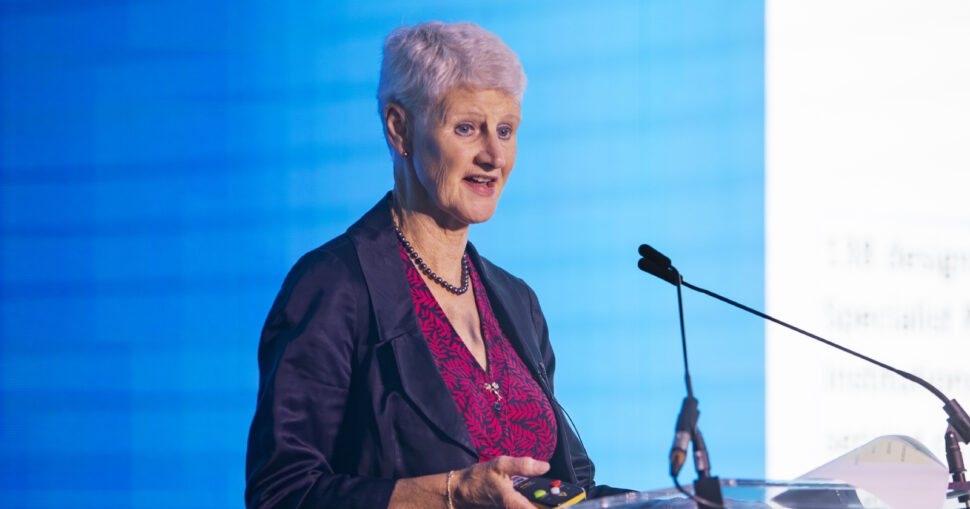Education Partnership North East CEO Ellen Thinnesen will become England’s fourth FE Commissioner in January – and face a new Ofsted inspection framework, a post-16 education strategy reboot and calls for a “reset” with the sector.
Announcing the appointment last week, the Department for Education said Thinnesen would be expected to “drive improvement at pace across the sector” and play a “key role” in helping the government tackle the rising numbers of young people not in education, employment and training (NEET).
Thinnesen said it was a “great privilege” to take on the role at a “crucial time when skills are vital to delivering the government’s missions for growth and opportunity”.
By the time Thinnesen officially takes over from current FE Commissioner (FEC) Shelagh Legrave, the new Ofsted inspection regime should be in place, the government will have set out November’s Budget, and the long-awaited white paper on post-16 education and skills should be published.
College and sector leaders say each of these issues will shape Thinnesen’s tenure as FEC at the same time as colleges battle mounting staffing, capacity and financial challenges.
The announcement came months after a national leader of FE, part of the FEC team, was parachuted in to support the interim principal of Burnley College after Ofsted inspectors found the college had “misled” students by inflating achievement rate data.
The incoming FEC will inherit an intervention caseload including South Devon College, which recently required a £1.5 million loan to ease cash pressures, and Weston College, which is under investigation for historic financial irregularities.
Legrave’s legacy
The FEC role first appeared in the 2013 DfE strategy document Rigour and Responsiveness in Skills as the government’s chief troubleshooter for underperforming colleges. Ministers empowered the post to demand “rapid”, “rigorous” and “decisive” improvements to struggling colleges’ financial management and/or education quality or face serious sanctions.
Since then, the role has evolved, with principals welcoming the current FE Commissioner Legrave’s focus on pre-emptive action and support services to avoid formal intervention.
Colin Booth, chief executive of Luminate Education Group, said the commissioner’s office must retain the supportive and approachable reputation it gained under Legrave.

“I think Shelagh’s made the FE Commissioner’s office something you can go to for support and help. It’s much more approachable. There isn’t another part of the DfE that is almost entirely populated with people who used to run colleges,” he said.
Booth also valued Legrave’s visibility in the sector, particularly her frequent college visits, and hoped that will continue.
Alun Francis, CEO of Blackpool and The Fylde College and the government’s social mobility commissioner, agreed.
He told FE Week: “I think Ellen’s a really good choice. I’m particularly pleased to see somebody whose experience is in northern colleges and post-industrial towns. Having that perspective is helpful.
“What I would say about my experience of the last two FE commissioners is we’ve seen a real evolution in the way they’ve worked. They’ve made the role focused on the right kind of approach, which is early intervention support, less crisis intervention, more about helping people navigate the challenges of FE in a successful way.”
Stop. Collaborate and Thinnesen
While the FEC role has evolved, its core function remains turning around underperforming colleges. It’s not clear how one central intervention trigger – the ‘inadequate’ overall effectiveness Ofsted grade – will apply under the inspectorate’s proposed new inspection model, which does away with the headline overall grade and introduces up to 20 individual grades for colleges.
College finances are now overseen directly by the DfE following the closure of the Education and Skills Funding Agency.
David Hughes, chief executive at the Association of Colleges, said the relationship between the FEC, Ofsted and DfE was ripe for a “reset” and should be “set out clearly”.
Hughes added that the commissioner should avoid sliding back into a “punitive intervention regime”, and called for notices to improve on quality improvement to be issued “sparingly rather than liberally”.
He said: “I think there’s a reset moment I’m hoping Ellen will help lead, because what we don’t want is a return to a sort of punitive intervention regime. We want a balance, and intervention only where it’s the last resort.”
Booth mused that the upcoming white paper could call upon the FEC’s expertise beyond colleges, noting that crackdowns on subcontracting and talk of area reviews, mergers and insolvencies in universities mirror proposed solutions to colleges’ financial struggles over the past decade.
Francis believes the commissioner’s office should push harder on collaboration.
“Some of the new challenges for colleges are going to be how do you collaborate with neighbouring colleges, and with other partners like HE,” he said. The FEC, he added, is well-placed to spread good practice on curriculum efficiency, governance and leadership.
But Francis was clear that college staffing should be a top priority for Thinnesen.
“There’s a real challenge around wellbeing of our staff, not just recruitment and retention. I think that’s going to be an important theme over the next few years,” he said.
















“Hughes added that the commissioner should avoid sliding back into a “punitive intervention regime”, and called for notices to improve on quality improvement to be issued “sparingly rather than liberally”.
His suggestion would be taken more seriously if his organisation stopped defending the indefensible. Just a thought…